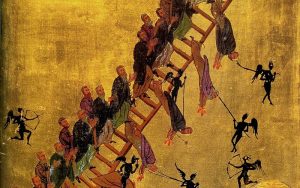 Fourth Sunday of the Great Fast: Commemoration of our Holy Father John of the Ladder
Fourth Sunday of the Great Fast: Commemoration of our Holy Father John of the Ladder
We know little about the life of John, the Hegumen [abbot] of the Monastery of Mt. Sinai, but he has left us one of the greatest spiritual testimonies of the Christian faith, his work called the “Ladder of Virtues.” It was written, certainly, in a monastic environment, which has always been the home for the seeking of perfection as commanded by Christ: “So be perfect, just as your heavenly Father is perfect. (Matthew 5:48)” His book, then, was read in Eastern monasteries during the Great Fast. Though his work was for monks, each of us has a vocation common with monks to seek perfection in Christ, and so we can all profit from his work. He reminds us that sanctification is not instant, but it is a lifetime project, “All of us, gazing with unveiled face on the glory of the Lord, are being transformed into the same image from glory to glory, as from the Lord who is the Spirit. (2 Corinthians 3:18)” This is what our Father John teaches us: “The Christian is one who imitates Christ in thought, word and deed, as far as is possible for human beings, believing rightly and blamelessly in the Holy Trinity.” (Step 1, Section 4)
“Having heard the Gospel of the Lord, O venerable Father John, you left this world, counting as nothing the riches and glory that it offered. Then you cried out to everyone: Love the Lord and you shall find eternal favor, for nothing is preferable to his love. And when he shall come in glory, you will find repose with all the saints. Through their prayers, O Christ, grant mercy to our souls.” (Doxasticheron at Psalm 140, Vespers of the Fourth Sunday of the Great Fast)
Meditation by Archpriest David Petras
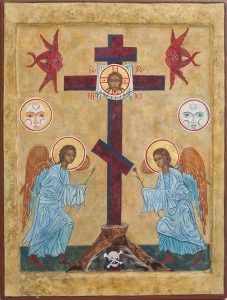 The first half of the Great Fast tells us the stories of Adam and Eve and their children, and the flood of Noah. It is a story of the creation of a perfect world and how that has been marred by human sin. It tells of the end of paradise, “The Lord God therefore banished him from the garden of Eden, to till the ground from which he had been taken. He expelled the man, stationing the cherubim and the fiery revolving sword east of the garden of Eden, to guard the way to the tree of life” (Genesis 3:23-24).
The first half of the Great Fast tells us the stories of Adam and Eve and their children, and the flood of Noah. It is a story of the creation of a perfect world and how that has been marred by human sin. It tells of the end of paradise, “The Lord God therefore banished him from the garden of Eden, to till the ground from which he had been taken. He expelled the man, stationing the cherubim and the fiery revolving sword east of the garden of Eden, to guard the way to the tree of life” (Genesis 3:23-24).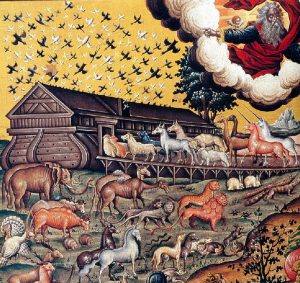 One the key parts of the Great Fast is attending to Baptism. Do we realize the import of Baptism and its roots?
One the key parts of the Great Fast is attending to Baptism. Do we realize the import of Baptism and its roots?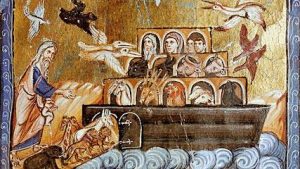 During this week, at Vespers, we read the story of the flood and the salvation of the righteous man Noah and his family. At first, this might seem to be the dark side of God, and on Friday, we heard: “When the Lord saw how great the wickedness of human beings was on earth, and how every desire that their heart conceived was always nothing but evil, the Lord regretted making human beings on the earth, and his heart was grieved. So the Lord said: I will wipe out from the earth the human beings I have created, and not only the human beings, but also the animals and the crawling things and the birds of the air, for I regret that I made them.” The story of the flood may have some historical basis, as a great flood in the Mediterranean basin in pre-history, but the story is iconic. (Noah could not have brought all the animal species on the ark.) The story tells us that the “wages of sin is death” (Romans 6:23).
During this week, at Vespers, we read the story of the flood and the salvation of the righteous man Noah and his family. At first, this might seem to be the dark side of God, and on Friday, we heard: “When the Lord saw how great the wickedness of human beings was on earth, and how every desire that their heart conceived was always nothing but evil, the Lord regretted making human beings on the earth, and his heart was grieved. So the Lord said: I will wipe out from the earth the human beings I have created, and not only the human beings, but also the animals and the crawling things and the birds of the air, for I regret that I made them.” The story of the flood may have some historical basis, as a great flood in the Mediterranean basin in pre-history, but the story is iconic. (Noah could not have brought all the animal species on the ark.) The story tells us that the “wages of sin is death” (Romans 6:23).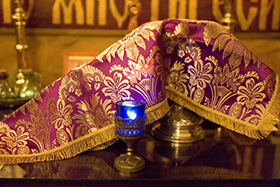 Communing from the Body and Blood of the Master during the period of spiritual combat.
Communing from the Body and Blood of the Master during the period of spiritual combat.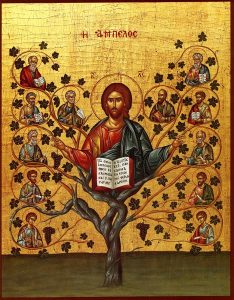 To inspire our prayer today, here are 2 texts from the Liturgy and a reflection on them.
To inspire our prayer today, here are 2 texts from the Liturgy and a reflection on them.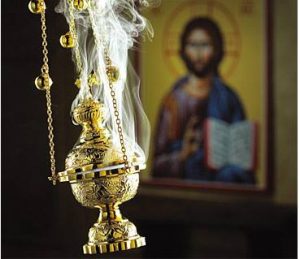 Matins:
Matins: 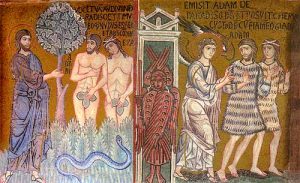 The readings from Genesis on the Fridays of the Great Fast point like an arrow to the covenant made on Good Friday, when our Lord gave his body and blood as a new covenant for the life of the world.
The readings from Genesis on the Fridays of the Great Fast point like an arrow to the covenant made on Good Friday, when our Lord gave his body and blood as a new covenant for the life of the world.